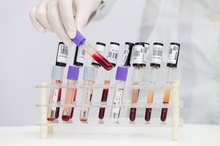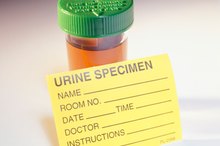What Is Normal Amount of Protein in Urine?
Your kidneys continuously filter your blood, excreting waste products while holding back proteins and other important molecules. Healthy kidneys normally allow almost no protein to be lost in the urine 2. Although protein in the urine, or proteinuria, is an important marker of disease, there are benign causes of proteinuria, as well 2.
Testing for Urine Protein
If your kidneys are functioning normally, you should have almost no detectable protein in your urine 2. Several common laboratory tests are used to check for proteinuria, including urine dipsticks for quick screening purposes, automated instruments for a more sensitive measurement of total protein and 24 hour urine collections to look for protein loss over time 12. Although results can vary somewhat between different laboratories, the amount of protein in a random sample of urine is normally less than 8 mg/dL and for a 24-hour collection, less than 150 mg total, according to MedlinePlus 2.
Increased Protein in Urine
How to Read a Urinalysis
Learn More
Increased urine protein levels are a non-specific finding seen with a wide variety of medical conditions, ranging from totally harmless to potentially life-threatening 2. Common causes for proteinuria include kidney disease, high blood pressure, diabetes, drugs, infections and tumors such as multiple myeloma.cause:
- Common causes for proteinuria include kidney disease
- high blood pressure
- diabetes
- drugs
- infections
- tumors such as multiple myeloma
Increased amounts of protein in the urine are never considered normal 2. However, mild proteinuria doesn’t always indicate a serious disorder. Additional testing and evaluation by your health-care provider is necessary to make this determination.
- Increased urine protein levels are a non-specific finding seen with a wide variety of medical conditions, ranging from totally harmless to potentially life-threatening 2.
Benign Causes of Proteinuria
Several conditions cause protein to appear in your urine without indicating a serious problem 2. A variety of medications can interfere with accurate protein measurements, including many common antibiotics, lithium, salicylates or any drug that damages the kidneys. Orthostatic proteinuria also occurs in young adults, characterized by protein appearing in the urine when the person is up and walking during the day, but not found in urine from overnight while lying down 2. This condition usually disappears by age 30.
Approach to Proteinuria
BUN Vs. Serum Creatinine: Which Is Better for Renal Insufficiency?
Learn More
Proteinuria serves as an important marker for many serious diseases, so a finding of protein in your urine needs further medical evaluation 2. Your health care provider will normally perform a complete history and physical exam, review all your laboratory results and order further testing as needed to reach a diagnosis. Keep in mind that not every case of proteinuria indicates a serious problem, and a mild elevation in protein might simply reflect your body’s normal reaction to a temporary illness or other benign situation, especially if you are otherwise young and healthy.
Related Articles
References
- Lab Tests Online: Urine Protein and Urine Protein to Creatinine Ratio
- MedlinePlus: Protein-urine
- “Essentials of Nephrology, Second Edition”; R. Kasi Visweswaran, Editor; 2009
- U.S. National Library of Medicine. MedlinePlus. Protein in Urine. Reviewed October 2, 2019.
- National Institute of Diabetes and Digestive and Kidney Diseases. Nephrotic Syndrome in Adults. Updated February 2014.
- Gorriz JL, Martinez-castelao A. Proteinuria: detection and role in native renal disease progression. Transplant Rev (Orlando). 2012;26(1):3-13.
- Zeeuw DD, Remuzzi G, Parving H-H, et al. Proteinuria, a target for renoprotection in patients with type 2 diabetic nephropathy: Lessons from RENAAL. Kidney International. 2004;65(6):2309-2320. doi:10.1111/j.1523-1755.2004.00653.x.
Resources
Writer Bio
Fred Schubert is a retired physician with both writing and teaching experience during his professional career, reaching back to 1983. Since 2009 he has been writing periodic articles on general science for his local newspaper, "The Dalles Chronicle." Schubert holds a Bachelor of Arts degree in biology and a M.D. from the Oregon Health Sciences University.








